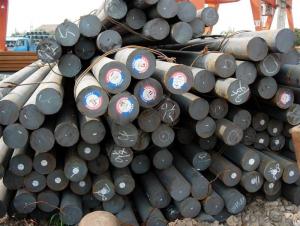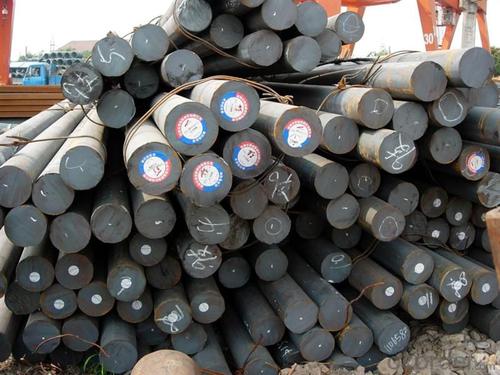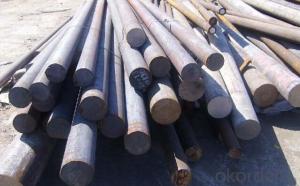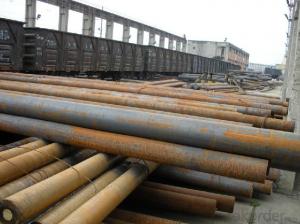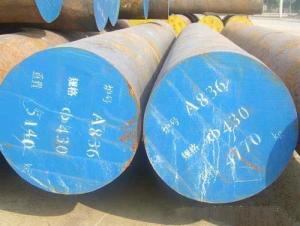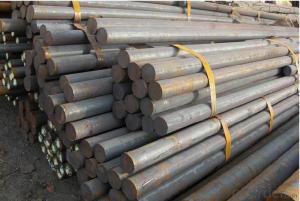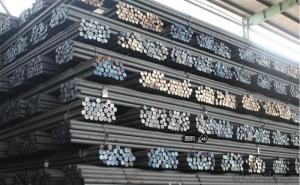S35C Forged Alloy Steel Round Bars with Cheap Price
- Loading Port:
- Tianjin
- Payment Terms:
- TT OR LC
- Min Order Qty:
- 25 m.t.
- Supply Capability:
- 50000 m.t./month
OKorder Service Pledge
OKorder Financial Service
You Might Also Like
Specification
Product Description:
1. Sizes: Diameter: 16mm-300mm; Length: 6m, 9m, 12m
2. Grade: 35#, SAE1035, S35C, C35
3. Invoicing on theoretical weight or actual weight as customer’s request
4. Shape: Round bar, solid bar of steel with circular section
5. Technique: Hot rolled, forged, cold rolled
Chemical Composition:
C | Si | Mn | P | S | Ni | Cr | Cu |
0.32-0.40 | 0.17-0.37 | 0.50-0.80 | ≤0.035 | ≤0.035 | ≤0.30 | ≤0.25 | ≤0.25 |
Packing and Delivery:
Packing in bundle with steel strips and shipped by break bulk vessel or container (depend on target market and different ports)
Delivery Detail: Approx.45 days
Usage and Applications:
1. Steel round bar is used in a large number of architectural and engineering structures. Or it can be used in construction of plants for the production of steel house frames, high-voltage transmission towers, bridges, vehicles, boilers, containers, ships, etc.
2. And we can use this kind of product on the performance of the mechanical parts if the demand is not very high.
3. Some especial material steel round bar can be used for main shaft of steamer, hummer shank, with big section and supper force.
Specification:
OD | Length | Material | Standard | Technique |
16-260mm | 6-12m or aques per request | 20# | GB ASTM DIN | Hot rolled |
16-350mm | 35# | |||
200-500mm | 35# | Forged | ||
20-250mm | 20Cr,40Cr,20-42CrMo | Hot rolled | ||
50-300mm | GCr15 |
Main product pictures:
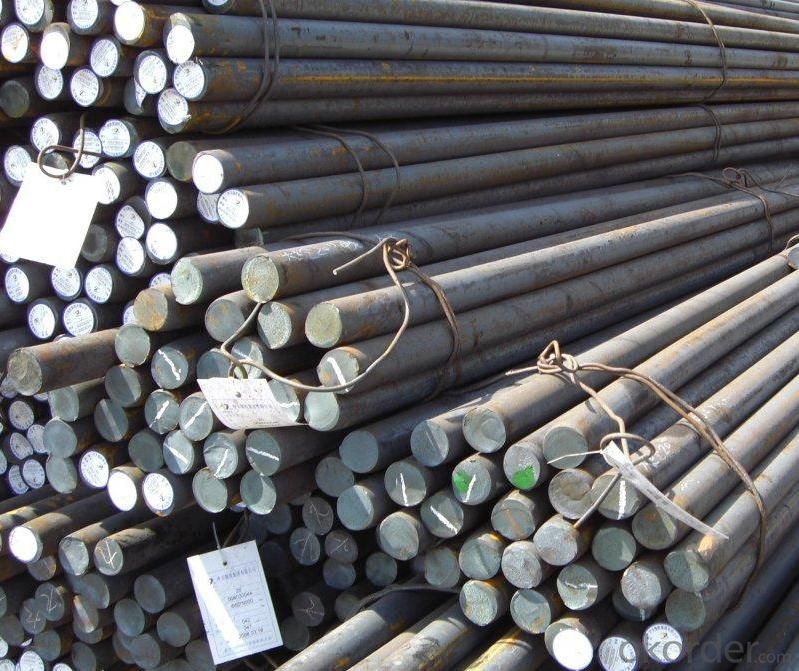
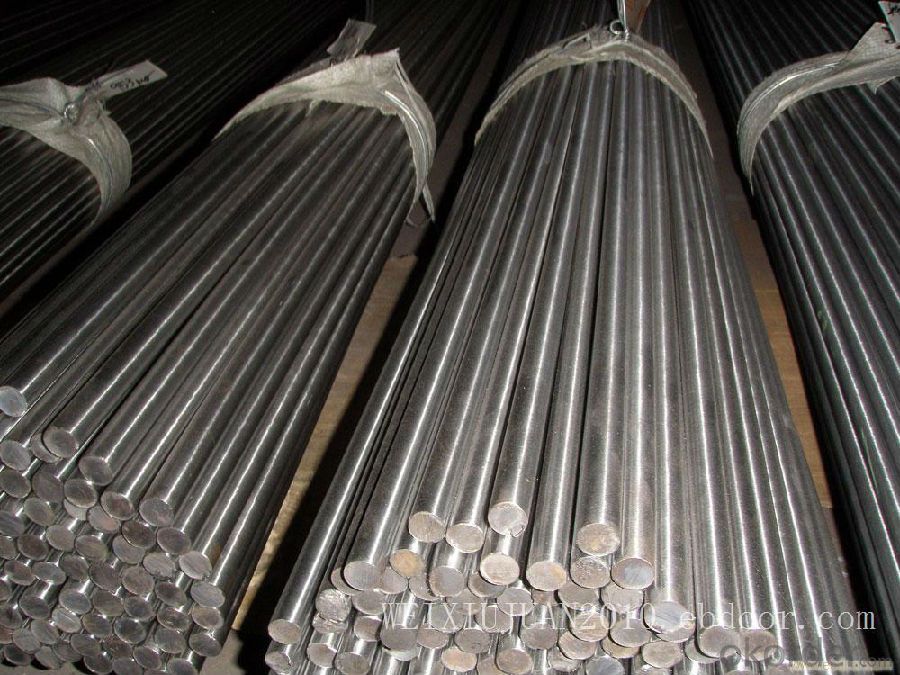
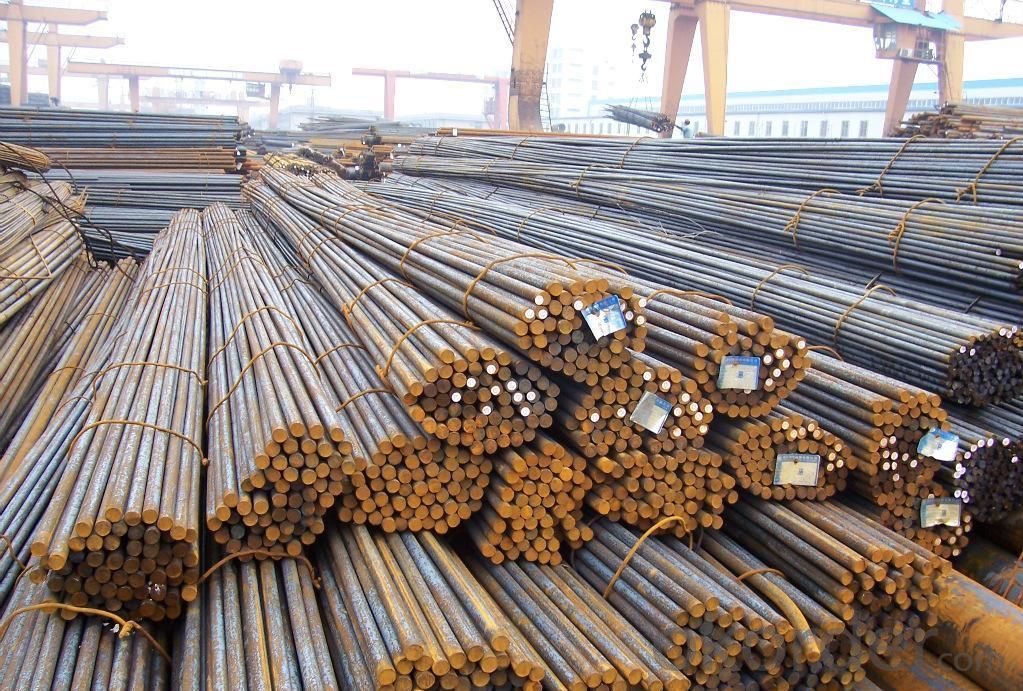
- Q: Can special steel be used in the energy sector?
- Yes, special steel can be used in the energy sector. Special steel refers to various types of high-performance alloys that are specifically designed for applications that require exceptional strength, durability, and resistance to corrosion and extreme temperatures. These properties make special steel an ideal choice for numerous components used in the energy sector. In the oil and gas industry, special steel is commonly used for the construction of pipelines, drilling equipment, and offshore platforms. Its high strength and corrosion resistance help in ensuring the integrity and reliability of these critical structures, even in harsh environments. Special steel is also widely utilized in power generation plants. For example, in thermal power plants, where steam is generated to produce electricity, special steel is used to manufacture boiler tubes and pressure vessels. The exceptional heat resistance and structural integrity of special steel ensure the safe and efficient operation of these components under high temperatures and pressure. Furthermore, special steel finds applications in renewable energy sectors such as wind and solar power. In wind turbines, for instance, special steel is used to manufacture rotor shafts, gears, and bearings, which are subjected to high mechanical loads. Similarly, in concentrated solar power plants, special steel is employed in the construction of the heat exchangers, receivers, and storage systems. Overall, the use of special steel in the energy sector is crucial for enhancing the overall performance, safety, and longevity of various components and structures. Its unique properties make it an indispensable material in supporting the energy industry's infrastructure and operations.
- Q: What are the different types of electrical steel?
- There are primarily two types of electrical steel: grain-oriented electrical steel (GOES) and non-grain-oriented electrical steel (NGOES). GOES is specifically designed to have superior magnetic properties in a specific direction, making it ideal for power transformers and other high-efficiency electrical devices. On the other hand, NGOES does not have a preferred magnetic direction and is commonly used in motors, generators, and other general-purpose electrical equipment.
- Q: How does special steel contribute to the oil and gas industry?
- Special steel plays a vital role in the oil and gas industry by providing the necessary strength, durability, and corrosion resistance required for various applications. It is used in the construction of pipelines, drilling equipment, wellhead components, and offshore platforms. The unique properties of special steel enable it to withstand high pressures, extreme temperatures, and harsh environments, ensuring the safety and efficiency of oil and gas operations.
- Q: How is wear-resistant tool steel used in the production of cutting tools?
- Wear-resistant tool steel is used in the production of cutting tools due to its exceptional hardness and resistance to wear and abrasion. This steel is specifically designed to maintain its sharpness and durability even when subjected to high temperatures and intense cutting forces. By using wear-resistant tool steel, cutting tools can effectively cut through various materials without losing their edge, resulting in improved efficiency and longer tool life.
- Q: What are the advantages of using special steel in industrial applications?
- Special steel offers several advantages in industrial applications: 1. Durability: Special steel is known for its exceptional strength and hardness, making it highly resistant to wear and tear. This durability allows it to withstand extreme conditions, such as high temperatures or corrosive environments. 2. Versatility: Special steel can be tailored to meet specific requirements, allowing for the production of a wide range of products. It can be alloyed with other metals or elements to enhance its properties, making it suitable for various industrial applications. 3. High performance: Special steel exhibits superior mechanical properties, including high tensile strength, toughness, and impact resistance. These characteristics make it ideal for applications that demand reliability and performance, such as machinery, tools, and equipment. 4. Resistance to corrosion: Special steel can be manufactured with corrosion-resistant properties, offering protection against rust and deterioration over time. This makes it suitable for applications exposed to moisture, chemicals, or harsh weather conditions. 5. Cost-effectiveness: Although special steel may have a higher initial cost compared to other materials, its long lifespan and low maintenance requirements make it cost-effective in the long run. Its durability and resistance to wear reduce the need for frequent replacements or repairs, resulting in reduced downtime and overall operational costs. In summary, the advantages of using special steel in industrial applications include durability, versatility, high performance, resistance to corrosion, and cost-effectiveness.
- Q: How does special steel contribute to the renewable energy conversion efficiency?
- Special steel plays a crucial role in improving the efficiency of renewable energy conversion by providing strength, durability, and resistance to extreme conditions. It is used in various components of renewable energy systems such as wind turbines, solar panels, and hydropower plants. The high strength-to-weight ratio of special steel enables the construction of taller wind turbine towers, allowing them to capture more wind energy at higher altitudes. Additionally, special steel is used in the production of high-efficiency solar panels, as it helps enhance their performance by increasing structural integrity and resistance to corrosion. In hydropower plants, special steel is employed to construct turbines and generators that can withstand the immense pressures and forces involved in generating electricity from water. Overall, the use of special steel in renewable energy systems contributes to their overall efficiency and longevity, aiding in the transition towards a sustainable energy future.
- Q: How does special steel contribute to weight reduction in manufacturing?
- Special steel contributes to weight reduction in manufacturing through its unique properties and characteristics. Special steels are designed to have high strength-to-weight ratios, allowing manufacturers to use less material while still achieving the desired strength and performance. This results in lighter and more efficient products without compromising their structural integrity. Additionally, special steels can be processed into complex shapes, enabling the production of intricate components that are both lightweight and strong. Overall, the use of special steel in manufacturing helps reduce the overall weight of products, leading to improved fuel efficiency, lower transportation costs, and increased sustainability.
- Q: What are the requirements for special steel used in aerospace defense applications?
- The requirements for special steel used in aerospace defense applications include high strength, excellent corrosion resistance, heat resistance, and the ability to withstand extreme temperatures and pressure. It should also possess good weldability, fatigue resistance, and non-magnetic properties. Additionally, the steel should meet strict quality and certification standards to ensure reliability and safety in critical aerospace defense applications.
- Q: How does special steel compare to other materials such as aluminum or titanium?
- Special steel, when compared to other materials such as aluminum or titanium, offers a unique set of advantages and characteristics. Firstly, special steel is known for its exceptional strength and durability. It has a higher tensile strength compared to aluminum and titanium, making it ideal for applications that require withstanding heavy loads or high-stress environments. This strength also provides resistance against wear and tear, ensuring a longer lifespan of the material. Another significant advantage of special steel is its ability to maintain its mechanical properties at extreme temperatures. While aluminum and titanium may experience a significant decrease in strength at elevated temperatures, special steel retains its structural integrity, making it suitable for applications that involve high temperatures or thermal cycling. In terms of cost-effectiveness, special steel often proves to be more affordable than titanium, especially in large-scale production. Although aluminum is generally cheaper than special steel, it may not possess the same level of strength or resistance to corrosion, which could limit its applicability in certain industries. Moreover, special steel has excellent machinability and can be easily formed into different shapes and sizes, allowing for greater design flexibility. This quality makes it suitable for various industries such as automotive, aerospace, construction, and manufacturing, where complex components or structures are required. Lastly, special steel exhibits superior corrosion resistance compared to aluminum and titanium. It can be treated or coated to provide additional protection against rust and other forms of degradation, extending its lifespan even further. In summary, special steel outperforms aluminum and titanium in terms of strength, durability, temperature resistance, and corrosion resistance. Its cost-effectiveness, machinability, and versatility make it a preferred material in various industries, where high-performance and reliability are crucial factors.
- Q: How is special steel used in the automotive industry?
- Special steel is used in the automotive industry for various applications such as manufacturing engine components, transmission parts, suspension systems, and safety features. It provides high strength, durability, and resistance to wear and corrosion, enabling vehicles to perform better and ensuring safety standards are met.
Send your message to us
S35C Forged Alloy Steel Round Bars with Cheap Price
- Loading Port:
- Tianjin
- Payment Terms:
- TT OR LC
- Min Order Qty:
- 25 m.t.
- Supply Capability:
- 50000 m.t./month
OKorder Service Pledge
OKorder Financial Service
Similar products
Hot products
Hot Searches
Related keywords
